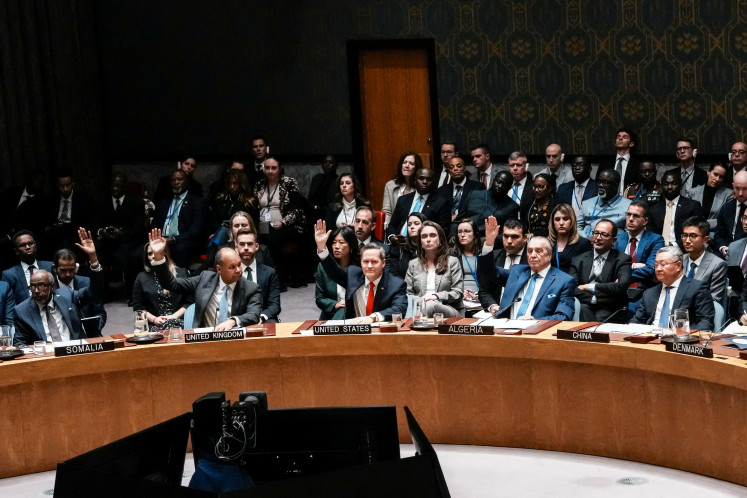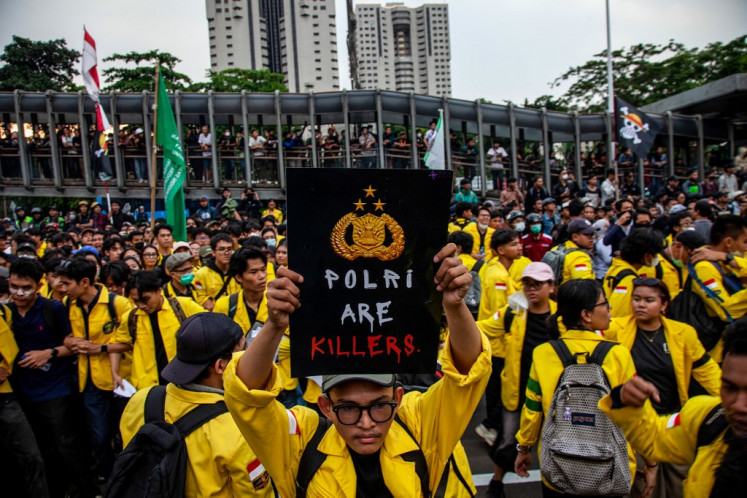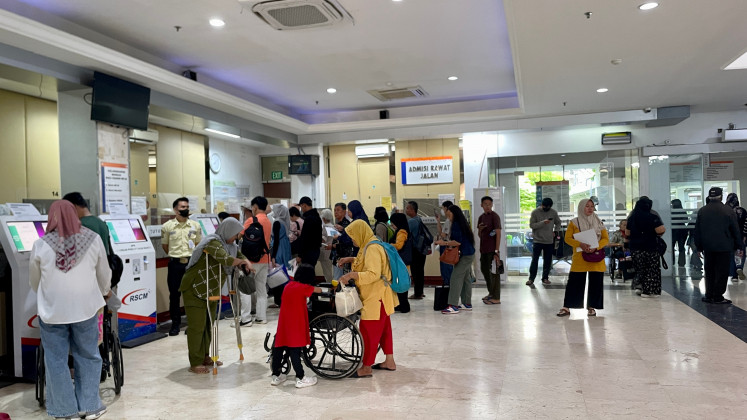Popular Reads
Top Results
Can't find what you're looking for?
View all search resultsPopular Reads
Top Results
Can't find what you're looking for?
View all search resultsAsfinawati: Defending minority rights
People may consider her a true representative of two minority groups in Indonesia: women and Acehnese, both groups that have been marginalized for years
Change text size
Gift Premium Articles
to Anyone
People may consider her a true representative of two minority groups in Indonesia: women and Acehnese, both groups that have been marginalized for years.
Minority groups -- whether based on ethnicity, religion, gender or sexual orientation -- are not determined based on numbers alone, but also on politics and social and economic factors.
"I have felt how uncomfortable it is to be a minority. So I decided not to use symbols and expressions, such as assalamualaikum (a Muslim greeting), to avoid causing discomfort among minorities," Jakarta Legal Aid (LBH) director Asfinawati said in an interview with The Jakarta Post last week.
Asfin, as she is usually called, first felt like a minority while attending elementary school in Bali.
"There was no Islamic teacher there," she said.
Religious instruction is mandatory in Indonesian schools. Some regions, such as predominantly Hindu Bali, are not always able to provide Islamic teachers.
Asfin was born in Bitung, North Sulawesi, on Nov. 26, 1976, to Acehnese parents. During her law career, she has handled many cases relating to minority groups.
With other activists, Asfin is currently helping defend Ahmadiah, an Islamic sect deemed heretical by the Indonesian Ulema Council (MUI) and facing a formal government ban.
Differing from mainstream Muslims, Ahmadiah followers believe their sect founder, Mirza Ghulam Ahmad, is a prophet who is carrying on the teachings of Prophet Muhammad.
Many moderate Muslims consider Mirza Ghulam just an ulema, and have urged the government not to ban the group, and to condemn the violence perpetrated against Ahmadiah followers.
In recent years, properties belonging to sect members, including mosques and houses in Mataram, West Nusa Tenggara, and Sukabumi, West Java, have been attacked and destroyed by religious mobs.
Although the MUI -- which released a fatwa declaring Ahmadiah heretical -- condemns violence, many radicals claim the attacks are justified by the religious edict.
"None of the masterminds of the attacks have ever been arrested. Some of the people who were arrested were just ojek drivers who were paid to attack Ahmadiah members," said Asfin, who graduated from the University of Indonesia's School of Law in 2002.
A videotape has surfaced showing a sermon by the secretary-general of a radical Islamic group, urging his supporters to kill Ahmadiah followers.
"If the court can prove that any attacks were conducted based on ulemas' sermons, they could probably be tried for instigating crimes," Asfin said.
Asfin, who was elected as the legal aid director in 2006, said that as a lawyer she would not engage in religious arguments about whether Ahmadiah was heretical.
"And I urge the ulemas not to intervene in the legal aspects. Asking the government to ban Ahmadiah is no longer a religious debate, but rather a legal matter," she said at a meeting on diversity attended by representatives of the sect.
She said the MUI was asking the government to follow Pakistan and Saudi Arabia in banning Ahmadiah and declaring its followers non-Muslims.
"Pakistan is not Indonesia. Our Constitution is not based on religion. We should not follow Pakistan or Saudi Arabia."
She said the Constitution guarantees freedom of religion, and that Indonesia has ratified several UN conventions that protect the economic, social and cultural rights of Indonesians, as well as civil rights.
She said if Ahmadiah was banned -- under pressure from radical groups -- it was possible that hardliners would also demand the government ban other minority faiths.
Besides its six official religions -- Islam, Catholicism, Protestantism, Hinduism, Buddhism and Confucianism -- Indonesia is home to hundreds of traditional belief systems.
Some leaders of traditional belief systems in North Sulawesi, South Sulawesi and West Java, during the meeting with Asfin last week, expressed concern over what they see as a rise in Islamic fundamentalism.
"Today, Ahmadiah is their target. Later, we could be the target of the fundamentalists. We can feel it," a leader of the Sunda Wiwitan belief, from Cigugur, West Java, said.
"Our religions are older and have been here longer than those imported religions," the leader said.
Some local administrations have issued sharia-inspired bylaws that, among other things, require women to wear so-called Muslim attire. These bylaws are seen by some as another threat to local cultures.
In some areas in West Java, groups of Sundanese have reportedly revived local culture in an effort to fight the perceived increase in fundamentalism. Some people in these areas have started to use the local greeting "sampurasun" instead of "assalamualaikum", even though they are Muslims.
Asfin calls on all people concerned about the continued diversity of Indonesia to work together to defend pluralism in the country.
"We should not only care about the Ahmadiah issue, but also the nation as a whole, as it is under threat."
Asfin and LBH Jakarta, together with dozens of non-governmental organizations, recently established the National Alliance for Religious Freedom.
The alliance hopes to gather thousands of people for a rally at Monas park in Central Jakarta on June 1 to commemorate the birth of the state ideology, Pancasila.










